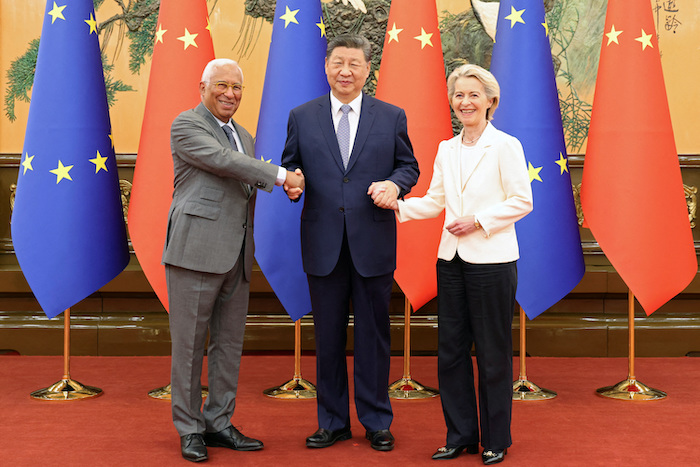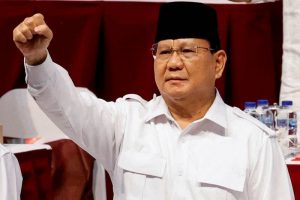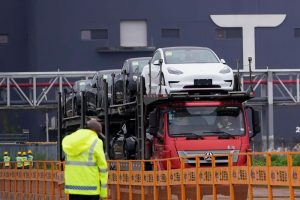The European Union warned Beijing that it expects China to respond to EU concerns over the war in Ukraine – to use its influence to urge Russia to accept a ceasefire in Ukraine, European Commission President Ursula von der Leyen said on Thursday.
Speaking in Beijing after meeting with Chinese President Xi Jinping during a one-day summit, Von der Leyen added that it is important that a ceasefire and negotiations take place to end bloodshed.
“How China continues to interact with Putin’s war will be a determining factor for our relations going forward,” she said.
ALSO SEE: Clashes Along Disputed Thai-Cambodian Border Claim 10 Lives
Earlier, Chinese President Xi Jinping urged top EU officials on Thursday to “properly handle differences and frictions” as he criticised Brussels’s recent trade actions against Beijing at a tense summit dominated by concerns on trade and the Ukraine war.
Expectations were low for the summit in the Chinese capital marking 50 years of diplomatic ties after weeks of escalating tension and wrangling that led to the duration being abruptly halved to a single day at Beijing’s request.
“The current challenges facing Europe do not come from China,” Xi told visiting European Commission President Ursula von der Leyen and European Council President Antonio Costa, state news agency Xinhua said.
Ties at an inflection point: Von der Leyen
He urged the EU to “adhere to open cooperation and properly handle differences and frictions”, after von der Leyen earlier called for a rebalancing of trade ties with the world’s second largest economy, saying relations were at an “inflection point”.
“Improving competitiveness cannot rely on ‘building walls and fortresses’,” Xi added, according to Xinhua. “‘Decoupling and breaking chains’ will only result in isolation.”
“It is hoped that the European side will keep the trade and investment market open and refrain from using restrictive economic and trade tools,” Xi said, in remarks some analysts say appeared intended more for his domestic audience.
EU trade actions in the past year have targeted Chinese exports of electric vehicles among other goods, and its officials have repeatedly complained about Chinese industrial overcapacity.
Xi also warned EU leaders to “make correct strategic choices”, in a further veiled criticism of Brussels’ recent hawkish stance on China.
“As our cooperation has deepened, so have imbalances,” von der Leyen told Xi during their meeting in Beijing’s Great Hall of the People, according to a pool report.
“We have reached an inflection point,” she added, urging China to “come forward with real solutions”.
She was referring to the EU’s trade deficit with China, which ballooned to a historic 305.8 billion euros ($360 billion) last year.
“We think increasing market access for European companies in China, limiting the external impact of involution, and reducing export controls are important steps forward,” von der Leyen told Premier Li Qiang later, according to a pool report.
But she described her meeting with Xi as “excellent”.
The two sides also issued a joint statement on climate, reiterating their commitment to new climate action plans across the whole economy.
They will boost cooperation in areas such as energy transition, adaptation, methane emissions management and control, carbon markets and green and low-carbon technologies, the joint statement said.
EU seen sealing deal with US
At the start of US President Donald Trump’s second term, both sides had more of a consensus in working together to tackle trade challenges from the United States, said Cui Hongjian, a foreign policy professor at Beijing Foreign Studies University.
“Recently the situation has changed,” Cui said. “The EU has continued to compromise with the United States, which means that there is currently a lack of impetus for EU-China ties to become closer.”
After intense negotiations, the EU is likely to seal a trade deal with the United States for a broad tariff of 15% on its exports, down from 30% threatened by President Donald Trump.
On Thursday, Costa said the EU officials discussed “at length” their expectations for China to discourage Russia in its war against Ukraine.
“We call on China to use its influence on Russia to respect the United Nations charter and to bring an end to its war of aggression,” Costa told Xi earlier.
The run-up to the summit saw tit-for-tat trade disputes and hawkish European rhetoric, such as a July 8 accusation by von der Leyen that China was flooding global markets as a result of its overcapacity and “enabling Russia’s war economy”.
In a posting on X, however, she struck a more conciliatory tone on Thursday, saying the summit offered an opportunity to “both advance and rebalance our relationship”.
Topics the Europeans were expected to raise in the talks are electric vehicles and China’s rare earth export controls that disrupted supply chains worldwide, causing temporary stoppages in European automotive production lines in May.
But China’s exports of rare earth magnets to the EU surged in June by 245% from May, to stand at 1,364 metric tons, though that was still 35% lower than the year-earlier figure, customs data showed.
On Thursday, China’s foreign ministry defended the rare earths curbs as being “in line with international practice,” while pledging stronger dialogue and cooperation with relevant countries and regions in the field of export controls.
- Reuters with additional input and editing by Jim Pollard
ALSO SEE:
China’s Losses From Floods, Disasters in First Half: $7.6 Billion
Is China Finally Set to Rein in its Huge Industrial Overcapacity?
Firms Underestimating Risks From Carbon-Fuelled Climate Change
China Plays Rare Earths Card in EV Tariff Negotiations With EU
China Export Curbs on Rare Earth Magnets: a Trade War Weapon
China Sets up Tracking System to Trace Its Rare Earth Magnets
Carmakers Stressed by China’s Curbs on Critical Mineral Exports
China Follows US Playbook in Rare Earth Crackdown; Tesla Hit
China Plunders Rare Earth Minerals as Myanmar’s Civil War Rages
EU Rejects US Offer to Cut Tariffs if it Pulls Away From China
























